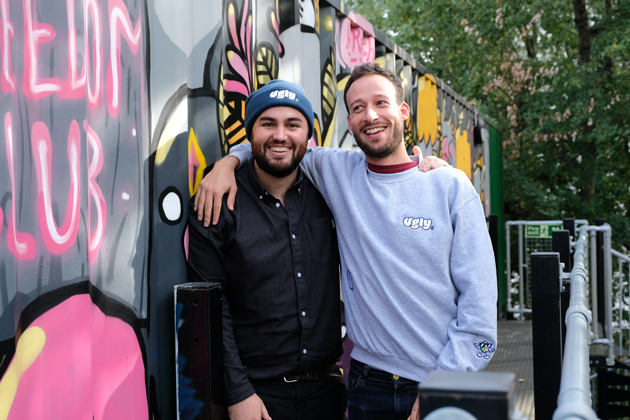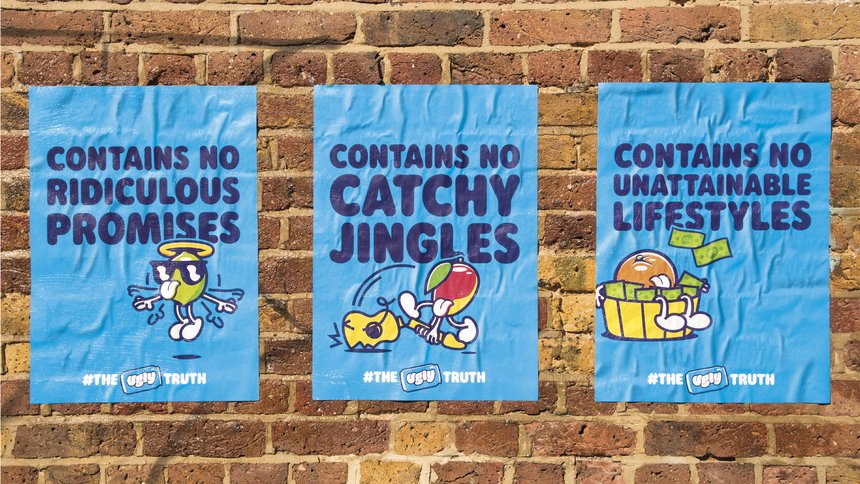How George Orwell inspired this scrappy challenger
How the duo behind Ugly Drinks came up with a big and bold brand idea to tempt consumers to switch from big soda.
Ugly Drinks started life in 2013 as a rant between friends in a pub. Why are soft drinks so unhealthy? Does refreshment have to mean sugar? Why does the advertising feel the need to promise the world?
The concept for Ugly was simple: A cold can of fizzy that a) was not unhealthy, and b) didn’t over-promise on things it couldn’t deliver. However, whilst most pub-born-ideas don’t see the next morning, this one soon became a reality.
Launched in 2015, Ugly is a soft drink founded by Hugh Thomas and Joe Benn, both having previously worked at Vita Coco. It’s sold in 4000+ stores in the UK including the two biggest supermarkets Sainsbury’s and Tesco. The products come in four natural fruit flavours and are made from sparkling water, with no sugar, sweeteners, or calories.
The ugly truth
Whilst revisiting the brand’s identity and positioning, the co-founders were really struck by a popular quote commonly credited to George Orwell. It reads: ‘In a time of universal deceit - telling the truth is a revolutionary act.’
“We were working on changing the brand a little and that quote stood out to us given what was happening in politics at the time,” Thomas says. “Whatever newspaper you read, whatever news sources you’re getting, there is uncertainty on both sides, and I think that’s led to a lot of tension. So for consumers who are craving the truth, especially in the socio-political, fake news, world we’re in at the moment, we have positioned Ugly as a brand that tells every truth.”
“What we’re expressing is just a desire for the truth”
The relevance of the stance for Ugly within the category too is clear. Thomas believes that the world’s biggest brands have been misleading consumers through their advertising for the last century. “There are adverts from the big soft-drinks companies from a hundred years ago showing smiling, happy faces enjoying sweetened sugary beverages,” says Thomas. “And the adverts and marketing today is essentially the same.”
Ugly makes no grand promises to change the world or make people happier or more beautiful. “This is a fruit flavoured sparkling water and that’s the truth”, says Thomas. “We’re not necessarily expressing a political view, what we’re expressing is just a desire for the truth.”
Co-founders Hugh Thomas and Joe Benn.
The positive rebel
It was important to Thomas that the brand avoided being seen as aggressive or serious in its challenging of “fake news” as it was thought this could be a turn off for consumers.
“The brand is all about subversion, but there are different ways of rebelling,” says Thomas, “You can go and smash things up, and be quite aggressive to get your point across, but we felt there are brands out there doing that already and ultimately this drink is for everyone.”
The pair defined the brand’s character as being a “positive rebel” as a way to ensure the brand and messaging was “tongue-in-cheek” and remained playful and approachable to consumers. “We still want to be that brand that people want to go and have a pint with at the end of the day,” says Thomas.
Motivating the base
Thomas and Benn have had to be imaginative in how they build brand awareness as a challenger with a limited marketing budget. Its initial, and low-cost strategy, is to enlist its first consumers as active brand advocates.
With health-conscious millennials increasingly rejecting drinks with high sugar content, Ugly feels it can leverage a consumer rebellion already well underway. The smart approach provides consumers with materials that symbolise this rebellion and can easily (and willingly) be shared on social media.
“It’s going to go through phases for us”
Consumers can “stick their tongue out” by covering their mouth with a life-size illustrated tongue which features on the can’s reverse. And much like the popular skate brand tactic to give away clothing to young skaters, Ugly provide consumers with stickers to “subvert” public falsehoods, advertisements and surfaces of their choosing.
“I think it’s going to go through phases for us,” says Thomas, “right now, we’re focussed on telling people about the ugly truth in soft drinks that needs to be exposed. But hopefully, in time, the brand can become bigger and we can stand for a lot more and begin to tackle other ugly truths.”
Ugly’s tongue stickers.
Creating a monster
As Ugly’s distribution expands into the US this year, through an online nationwide subscription model but also via a limited number of stores in New York City, it’s important that the business is equipped for this next stage of its development. Part of that is ensuring the brand positioning and brand story is clear and compelling enough to win in these new markets.
“Ugly position themselves as the brave hero”
A memorable story needs a conflict. It needs a hero. And often, a monster. The spread of misinformation and ‘Fake news’ is a genuine threat to society. And by co-opting this threat as the brand’s monster, Ugly position themselves as the brave hero in this story. A hero that can unite and bring a particular community together to fight falsehoods and speak truth to power.
George Orwell would be proud.
Although he also once said “Advertising is the rattling of a stick inside a swill bucket,” so perhaps not.
The Ugly Truth. 2018.




